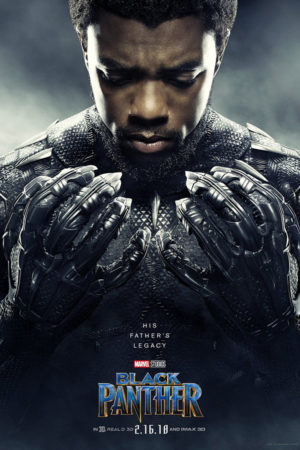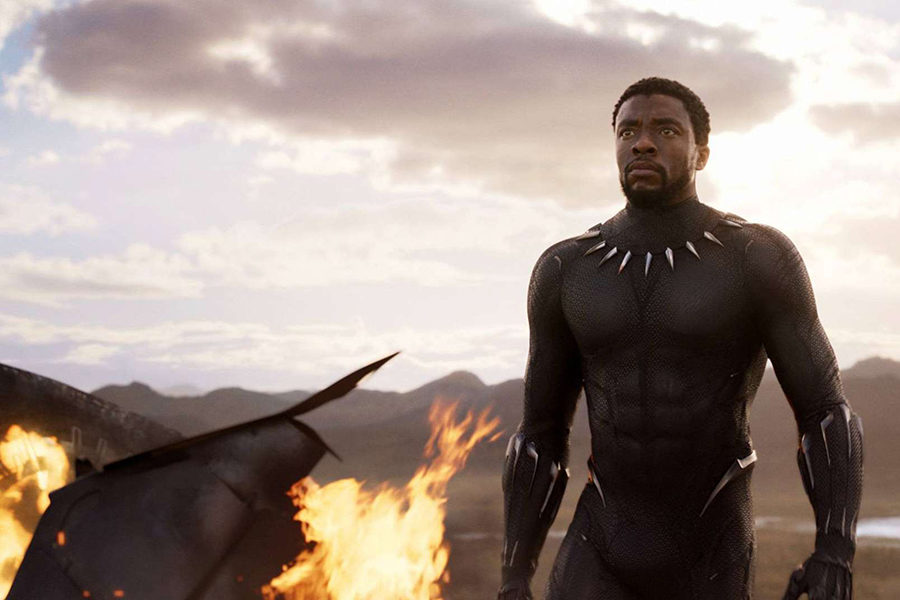“Black Panther” is Deeper Than the Typical Superhero
Marvel successfully created a cinematic masterpiece that challenges societal issues, yet isn’t overly aggressive.
PHOTO | Tribune News Service
Chadwick Boseman stars as the black panther in marvel studio’s “Black Panther.”
A perfect combination of African culture and modern day with a heavy emphasis on technology, Marvel’s “Black Panther” is nothing like previous movies from the production company. Featuring an almost entirely all-black cast and directed by Ryan Coogler, this movie is a stand out in every way.
“Black Panther” tells the exciting tale of Wakanda, a country in Africa that keeps out of foreign affairs. The nation sits on and mines vibranium, the strongest metal in the world that can essentially do anything. The rest of the world, however, is unaware of the metal and considers Wakanda a third world country. T’Challa (Chadwick Boseman) returns to his home in Wakanda to claim his throne as king and fulfill his duties of the Black Panther. When a villain named Erik Killmonger (Michael B. Jordan) challenges T’Challa’s reign, the two must fight for control of the country and defend its people.

The movie poster advertising the“Black Panther.”
Boseman portrays the character of T’Challa with grace and refinement, which adds an interesting dynamic not typically seen in mainstream superheroes. He has a certain honesty about him and reveals a genuine good nature. This is only one facet of the film that challenges an aspect of mainstream production. Primarily, the cast is almost entirely composed of African Americans, with the exception of one or two minor characters. This strategic casting is the opposite of most blockbusters and sends a message of equality that reaches far beyond the surface level. It’s a testament to American culture today, challenging white supremacy and underlying remnants of racism.
Another important facet of “Black Panther” is the role of women in Wakanda. T’Challa’s warriors are all female and never turn down a fight for their country or king. One particular scene near the end of the film shows male tribes kneeling and surrendering to Okoye (Danai Gurira), T’Challa’s general. Equality also echoes throughout this scene. In addition to physical strength, Wakanda’s extensive and well-developed science and technology center is headed by a young girl, who happens to be T’Challa’s sister Shuri (Letitia Wright). Both women do their respective jobs incredibly well, proving that women are capable of everything men are.
Along with race and gender equality, “Black Panther” tackles countless other social justice issues that are continually overlooked on the big screen. However, these themes are acknowledged in a calm, subtle manner that may not be picked up on by some viewers. Though these issues aren’t outright spoken or addressed, the simple acknowledgment is a huge step in social justice movements.
“Black Panther” easily surpasses all expectations but also sheds light on deeper issues in current society without disrespect toward those who don’t believe the same things. The film itself is well-made and every actor adds an interesting element or dynamic to the storyline. The plot is creative, interesting and unlike most superhero movies. “Black Panther” sets itself out in front of the pack sure to continue its success for Marvel.




Haley • Mar 3, 2018 at 3:17 PM
beautifully written review; LOVE this movie… you really covered the bases except touching on how much of a snack Michael b Jordan is and failed to include a picture of him but that is my only complaint